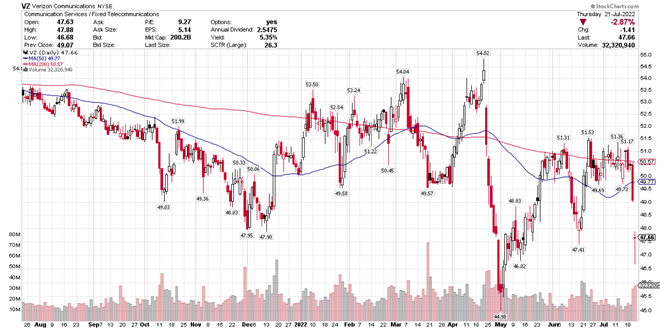
Shares of
Verizon NYSE: VZ tumbled in pre-market trade Friday after the company reported second-quarter earnings that missed Wall Street expectations.
Verizon earned $1.31 per share, down from $1.37 in the year-earlier quarter, missing analysts’ consensus views by a penny.
Verizon said this quarter’s results included $435 million pre-tax loss from special items, including a mark-to-market adjustment for pension liabilities, and amortization of intangible assets related to TracFone and other acquisitions.
Revenue came in at $33.8 billion, essentially the same as last year’s second-quarter, and slightly above analysts’ estimate of $33.7 billion.
Verizon’s results followed Thursday’s punishment of wireless rival AT&T NYSE: T. AT&T gapped down more than 7% after it lowered its free cash flow outlook, pointing to cited changing consumer habits in a slowing economy.
Notably, the company slashed full-year guidance. It now expects wireless service revenue growth of 8.5% to 9.5%, down from prior guidance of 9% to 10% growth.
It also cut its expectations for earnings growth to $5.10 to $5.25 per share, down from previous guidance for adjusted earnings per share of $5.40 to $5.55.
According to MarketBeat data, Verizon met or beat earnings views in each of the previous nine quarters.
Prior to Friday’s results, analysts had expected earnings to decline 1% for the full year, to $5.41 per share.
History Of Dividend Increases
With the broader market continuing to languish, despite a nascent rally in recent days, dividend payers like Verizon may look appealing (despite weaker-than-expected results) to investors hoping to optimize their return.
Verizon pays a dividend of $2.42 per share, for a 12-month trailing yield of 3.95%. The company increased its dividend annually for the past 16 years.
The stock’s price is down 8.3% year-to-date, but when you include dividends, the total return is -1.87%. That’s a great illustration of why it’s crucial to include dividends in your return calculation.
Verizon is a familiar name whose business model needs no explanation. The telecom giant has focused on building out its network in the past decade, and it now provides wider coverage than any of its rivals. Those improvements include expandson of Verizon’s fiber-optic network and adding 5G wireless technologies.
Verizon owns about 40% of domestic market share for postpaid phones. That’s more than either T-Mobile NASDAQ: TMUS or AT&T.
In its second-quarter report, the company cited total broadband net additions of 268,000, including 256,000 fixed wireless net additions. Total broadband net additions increased 39,000 from the first quarter of this year, and fixed wireless net additions increased 62,000 from the prior quarter.
The company also noted net 36,000 Fios Internet additions.
When it comes to the wireless business, Verizon booked service revenue of $18.4 billion, a 9.1% year-over-year increase. It reported total retail postpaid churn of 1.03%, and retail postpaid phone churn of 0.81%. Churn is a key wireless industry metric, and tracks the number of customers who discontinue service and move to another carrier.
Postpaid phone net additions in the quarter totaled 12,000.
Verizon has been focusing on its wireless and broadband networks, clearly the businesses of the future, rather than its legacy fixed-line business.
Of course, Verizon’s main competitors aren’t exactly hanging up the phone and calling it quits. They are also expanding their networks and adding new wireless coverage areas.
YTD Performance Vs. Rivals
Here’s how Verizon’s 1.87% decline this year stacks up against its sector and key competitors:
One of the drivers of sector performance this year is Meta Platforms NASDAQ: META, the sector’s most heavily weighted stock, which is down 45.57% year to date.
Verizon’s chart shows a decline that began in December 2020. Despite a growing dividend that helps offset technical weakness, it’s still worth evaluating whether a stock in a lengthy correction is worth purchasing, while other stocks - or securities such as inverse ETFs - are delivering positive returns at the moment.

Before you consider Verizon Communications, you'll want to hear this.
MarketBeat keeps track of Wall Street's top-rated and best performing research analysts and the stocks they recommend to their clients on a daily basis. MarketBeat has identified the five stocks that top analysts are quietly whispering to their clients to buy now before the broader market catches on... and Verizon Communications wasn't on the list.
While Verizon Communications currently has a "Moderate Buy" rating among analysts, top-rated analysts believe these five stocks are better buys.
View The Five Stocks Here
Click the link below and we'll send you MarketBeat's guide to investing in 5G and which 5G stocks show the most promise.
Get This Free Report